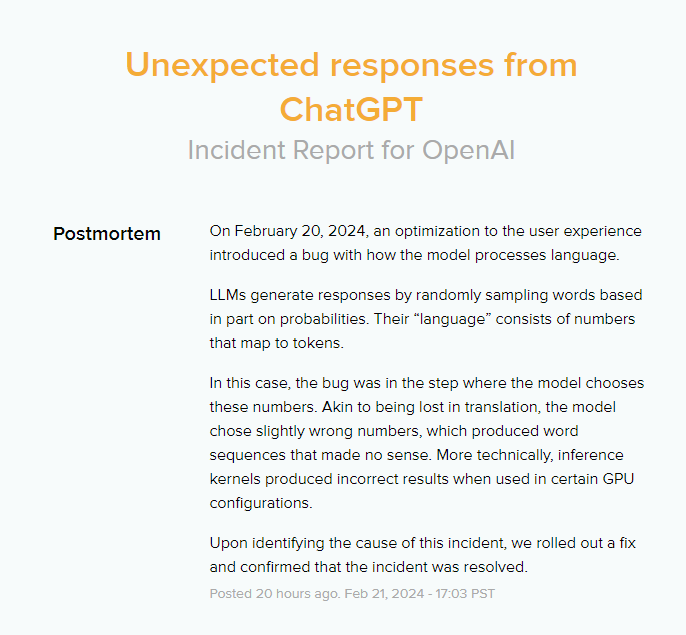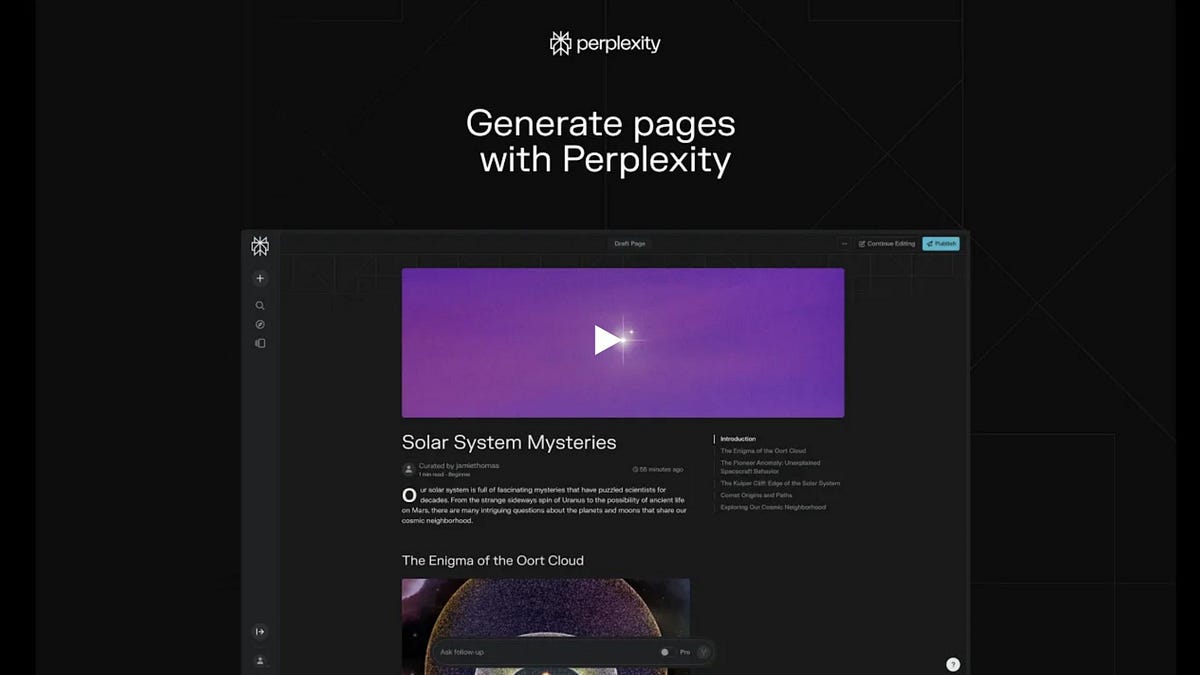Good morning, aspiring leaders of the next-gen! ☀️
🚀 Here’s what’s going on today in the AI space…
OpenAI reveals that GPT models don't "understand" but guess based on probabilities associated with large data sets. This guessing is made by mapping inputs to numerical tokens, which sometimes leads to incorrect or nonsensical outputs due to errors in number selection, akin to translation mistakes. Despite its utility in producing often correct guesses, this method lacks reliability compared to systems designed with true comprehension, highlighting a fundamental limitation in current AI models' ability to genuinely understand content.
Founded by Edward Tian and Alex Cui, young entrepreneurs in their 20s, GPTZero has become a profitable AI detection startup. The company, known for its tool that identifies AI-generated content, secured a $10 million Series A funding round led by Nikhil Basu Trivedi of Footwork. GPTZero, which launched a web app in December 2022, experienced rapid growth, with its user base escalating from 1 million to 4 million in one year. The startup reported a 500% increase in ARR over six months and has been profitable for several months, holding more cash on hand than the total raised to date.
Tesla shareholders have filed a lawsuit against CEO Elon Musk for starting a competing AI company, xAI, alleging it diverts resources from Tesla. The lawsuit claims Musk's actions breach his fiduciary duties and violate Tesla's business ethics code. This legal action highlights the intensifying conflicts within businesses over the direction and allocation of AI technologies and resources.

We scour 100+ sources daily
Read by CEOs, scientists, business owners and more
3.5 million subscribers
📔 #1 Insights This Week on AI. Click the Links to Read
AI-powered robots will become a common sight in our daily lives, performing tasks humans once thought impossible for machines.
Dr. Hiroaki Kitano is CEO of Sony AI Inc. Additionally, he is Executive Vice President and Officer in charge for AI Collaboration for Sony Corporation and CEO of Sony Computer Science Laboratories, Inc.
⬆️ ️ Trends: How Businesses Implement AI
Here's how AI is transforming document management: By turning a company’s documents into a searchable database using OpenAI, it enables instant access to critical information through natural language queries, automates the categorization and indexing of vast amounts of data, and enhances decision-making and productivity by reducing the time spent searching for information in a streamlined, efficient database.
In the rapidly evolving world of technology, staying ahead often requires innovative solutions to everyday problems. Jacob Marks, Ph.D., a machine learning engineer at the startup Voxel51, has done just that by transforming his company’s documentation into a highly efficient, searchable database using OpenAI.
The Challenge
Voxel51, known for its open-source computer vision toolkit FiftyOne, faced a common yet significant issue: managing extensive documentation. As the toolkit grew, so did the documentation, which became cumbersome for users to navigate through traditional keyword searches.
The Vision
Jacob Marks, tasked with enhancing the user experience, saw an opportunity. “We had just added support for vector search engines and text similarity queries to FiftyOne,” Marks explains. “This allowed users to search large datasets using natural language. However, our own documentation still required traditional keyword searches. I knew we could do better.”
The Solution
Marks decided to leverage OpenAI to create a semantically searchable vector database of Voxel51’s documentation. Here’s how he did it:
Standardizing the Documents: Marks began by converting all documentation, including Sphinx ReStructured Text (RST) and Jupyter notebooks, into a unified Markdown format. This made the content more manageable and easier to process.
Segmenting and Cleaning: He split the documents into smaller, coherent blocks, removing unnecessary elements like headers, footers, and links. This ensured that each segment was concise and relevant.
Generating Embeddings: Using OpenAI’s text-embedding-ada-002 model, Marks created embedding vectors for each text block. This model, known for its efficiency and cost-effectiveness, provided a 1536-dimensional vector for each text segment.
Building the Vector Index: Marks chose Qdrant, an open-source vector search engine, to host the vector index locally. This allowed for efficient storage and retrieval of the document embeddings.
Creating a Query System: By embedding the search queries and filtering results, Marks developed a system that could return the most relevant document segments based on user queries.
User-Friendly Interface: To make the system accessible, Marks wrapped it in a command-line interface and a Python API, ensuring ease of use for all users.
The Implementation
Marks’ approach was methodical and thorough. He set up the environment by installing necessary packages and tools, converted documents to a unified format, and used OpenAI for embedding. With Qdrant, he created a robust vector index and developed a filtering system to refine searches.
The Outcome
The result? A significantly improved search experience for Voxel51’s documentation. “This improved docs search is more than twice as likely to return relevant results compared to the old keyword search,” Marks reveals. Users can now perform complex queries and receive accurate, actionable results quickly.
Broader Implications
This innovative solution not only benefits Voxel51 but also offers a template for other companies facing similar challenges. By making documentation searchable and accessible, Marks has set a new standard in the tech industry.
Conclusion
Jacob Marks’ story is a testament to the power of innovation and the impact of leveraging cutting-edge technology to solve everyday problems. His work at Voxel51, transforming company documentation into a searchable database using OpenAI, showcases how a clear vision and methodical approach can lead to significant improvements in user experience and efficiency.
For those interested in adopting similar solutions, the code is available in the voxel51/fiftyone-docs-search repository. Marks’ journey provides valuable insights and a practical roadmap for enhancing document accessibility and usability in any organization.
🏟️ Most Important AI Events
💫 The Collective's Miami Mastermind: Navigating The Grand Acceleration! 💫
📆 June 21st to 23rd, 2024 - Miami, Florida
🚀 Why Navigate the Grand Acceleration?
In a world moving at an incredible exponential rate, traditional masterminds and conferences no longer suffice. So, we created a space where the audacious can build the future. This isn't just about AI and exponential tech that are truly disrupting our world; it's also about the mindset and reprogramming of the mind needed for this new age.
🌟 Who is this for?
Visionaries, conscious leaders, creators, business owners, and technologists who are ready to be part of something bigger than themselves. Whether you’re experienced in tech or not, this is your place to enhance and innovate. Connect with people making huge moves at the cutting edge of this technological and mindset revolution.

Day 2: AI Sessions & Pitch Competition Dive deep into the latest AI trends with sessions led by top experts. Discover how to leverage AI for your business and gain a significant competitive advantage. In the afternoon, watch or participate in an exciting Pitch Competition, where groundbreaking projects will be showcased to prominent investors, including:
Billion-dollar family office representatives
Chairman of the Crypto Task Force, Miami-Dade County
Steve Mandel, owner of several public companies and partner with Kevin Harrington, the original shark from Shark Tank
Angel investors
Top-tier finance and business leaders from Miami

⚡ ChatGPT Prompting
IDEAL CUSTOMER PROFILE. An ideal customer profile (ICP) is important because it helps businesses identify and target the most valuable customers who are most likely to benefit from and be satisfied with their products or services. By focusing on an ICP, companies can streamline their marketing efforts, enhance customer acquisition strategies, and improve retention rates. This targeted approach leads to more efficient resource allocation, higher conversion rates, and ultimately, increased revenue and business growth.
Provide the following info to
ChatGPT for context:
Product function
Pain pointstackled
Industy
Develop a detailed ideal
customer profile (ICP) for
our [PRODUCT]. Include
demographic information,
interests, pain points,
purchasing habits, and
media consumption. This
persona will guide our
targeted marketing efforts
and content creation.
ChatGPT knows what it doesn’t know. You don’t know what ChatGPT doesn’t know because it doesn’t tell you. We can cure this disconnect with one simple prompt:
“Before you start, please ask me any questions you have about this so I can give you more context. Be extremely comprehensive.”
ChatGPT will output something that seems good, even if it doesn’t have the information it needs. So why not force it to gather info it doesn’t know from the only person who does?
After using this prompt, ChatGPT will rattle off 10–15 insightful questions, asking you about information that you totally forgot that it needed. In your next prompt, simply list out the numbers of the questions and answer them sequentially.
Now that it has all the information it needs, it can write a significantly more informed output, complete with infinitely less guesswork. You’ll be amazed at the quality jump.
⚡ Hands-on: Supercharge With AI Tools
Work smarter, not harder!
tl;dv is a versatile AI-driven platform designed to enhance productivity and collaboration during meetings by providing summaries and insights across various platforms like Zoom, Google Meet, and Microsoft Teams. It automates meeting notes and integrates with your existing workflow, ensuring seamless access to transcripts, recordings, and actionable insights.

Steps to use tl;dv:
Visit the tl;dv website and sign up for a free account.
Connect tl;dv to your preferred meeting platform (Zoom, Google Meet, Microsoft Teams).
Start a meeting through your connected platform and enable tl;dv for recording and note-taking.
Utilize tl;dv's AI to generate meeting summaries and insights.
Access the recordings and transcripts from your tl;dv dashboard.
Set up AI-driven insight reports to analyze trends and performance across meetings.
Integrate tl;dv with other tools (like CRMs) through available integrations for enhanced workflow synergy.
For more detailed instructions and additional features, you can explore tl;dv's official website and resources.
I hope you find these resources helpful. Let me know if you have any questions, if there's anything else I can do to assist you, or what you would like to learn more about in AI.
Have an amazing day!
No more playing catch-up. It's time to GET AHEAD!!! 🚀🚀🚀
🙌🏼
Elena
⚡︎🔋 The Supercharged - loved by thousands of readers ❤️🙋♀️
The Supercharged is the #1 AI Newsletter for Entrepreneurs with 10,000 + readers working at the world’s leading startups and enterprises. The Supercharged is free for the readers. Main ads are typically sold out 2 weeks in advance. You can book future ad spots here.
Here's the Disclaimer: None of what I share is financial advice. This newsletter is for convenience and educational purposes only and is not investment advice or a solicitation to buy or sell any NFTs, Crypto, AI, or anything else. Please do your research and consult with a pro.








